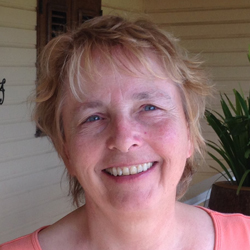
by Judy Sorum Brown
Leadership Educator and Poet, USA
6 May 2020
Share:
We tend to think the circumstances of the pandemic are like nothing we’ve ever experienced, that we have no personal experience to fall back on, to guide us. Yet if we dig deep into our own life history, we are likely to find that we can see capacities we have that allowed us to weather fearful and uncertain happenings earlier in life.
Asking ourselves and others we work with to think of a time that felt like this, and to note the capacities that made it possible to come through it, can give us access to our own overlooked strengths and courage.
A colleague, finding himself at sea in this pandemic, asked me whether I’d ever been through anything like this before. To my surprise, my mind (and my emotions) went straight back to an early work experience: long before the PhD, long before being the CFO of Maryland’s business school and head of its Executive Programs, before being a White House Fellow, or an executive with the Aspen Institute, or a poet, I was a Pan American Flight Attendant working on a London to JFK flight that lost an engine.
That experience is the subject of my poem “Slow motion,” written in response to my colleague asking me that simple question.
Slow motion
How long will
The pandemic last?
We don’t know.
How long can we
Go on like this?
No telling.
How will it end?
We’ll see.
He asked me if
I’d ever lived through
Something similar.
What came to mind
(or rather to my gut,
the punch of fear)
Was years ago:
I was a flight attendant
On a big jet
Crossing the Atlantic,
Heading for New York.
We lost an engine.
No problem, said the Captain
On the intercom ‒ it flies
On three. But not from
London to New York. And
With the weight of fuel
We carried for the long trip overseas
We were too heavy
To land on three engines.
Not to worry, he assured us:
We’d simply need to circle for a while
Out over the Atlantic
Dumping fuel til
We were light enough to land.
As it turned out, it took an hour—
An eternity of walking
Up and down the aisle,
Serving coffee, calming people,
Wondering how, and when,
It would all end.
Finally he swung the jet around and
Headed back toward Heathrow.
That flight back in
Was a long one.
We landed safely.
This pandemic now unfolding
Feels like that
But in slow motion.
— Judy Brown, April 10, 2020
Today I can see that the poem is about a leader being what Vaclav Havel termed a “non anxious presence” in a crisis – that was true of the captain, and it was also true of me. The term “non anxious presence” came from Havel’s video address at the 2009 ILA Global Conference in Prague and it stays with me.
Havel said he was called by his people back to the city (from a retreat he’d needed to recoup from the leadership demands of the uncertainty of the revolution). He returned reluctantly, yet he learned that while there was nothing only he could do back in Prague, what they needed was his non-anxious presence. That notion of leadership being a non-anxious presence has guided me ever since. I think it confirmed something I’d always known, and that I certainly had experienced in myself and in the captain on the long flight back to Heathrow many years before.

Judy Sorum Brown is a leadership educator and poet whose work revolves around dialogue, creativity, transitions, and change. A former White House Fellow, she served in several capacities at the University of Maryland. She holds a PhD in Comparative Literature from Michigan State University. Currently she designs and leads executive programs for those in the field of elder care. Her books include, A Leaders Guide to Reflective Practice, The Art and Spirit of Leadership, and several collections of her poetry including Simple Gifts and No One Swims Alone. Judy is a long-time member of the ILA.

